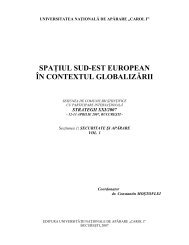Impact strategic nr.6-7 - Centrul de Studii Strategice de Apărare şi ...
Impact strategic nr.6-7 - Centrul de Studii Strategice de Apărare şi ...
Impact strategic nr.6-7 - Centrul de Studii Strategice de Apărare şi ...
- No tags were found...
Create successful ePaper yourself
Turn your PDF publications into a flip-book with our unique Google optimized e-Paper software.
ACTUALITATEA POLITICO-MILITARĂ<br />
on organization, instructing and teaching levels in concordance<br />
with the implications <strong>de</strong>rived from the relations<br />
between the military institution and society (political<br />
society, civil society). An essential change refers to the<br />
change of recruiting system, to the volunteer adopting for<br />
all the military categories. Adopting the volunteer system<br />
means a transition from a mass army to a professional one.<br />
This transition is required by some economical, political,<br />
military, social, <strong>de</strong>mographic factors. The necessity of<br />
changing the army <strong>de</strong>rives from some multiple internal<br />
and external <strong>de</strong>terminations. By internal <strong>de</strong>terminations<br />
we mean: 1) social, economical, political, cultural changes<br />
taken place in the Romanian society, as a result of adopting<br />
the market economy and of the reform process of the<br />
whole society and its institutions, including army. Therefore,<br />
all activities are appreciated from the efficiency point<br />
of view. That is why the army activity is appreciated from<br />
the economical efficiency perspective. One of the first<br />
consequences refers to stressing the Army’s professionalization.<br />
This does not mean that in present the Romania’s<br />
Armed Forces are not a professional organization (from<br />
the sociological point of view), but the recruiting system<br />
has to be studied (from the economical perspective, too)<br />
of a large part of the military personnel (MAC). In addition,<br />
the state promotes the principle of all the citizens to<br />
be equal in front of the law. As a result, all young people,<br />
able physically and mentally, should answer positively<br />
when asked to join the army. But there are enough young<br />
people who are trying to eva<strong>de</strong> this legal obligation. This is<br />
a common situation in all the countries where conscription<br />
works. Comparing the conscripts with the young people<br />
of their generation not asked to join the army, the formers<br />
might feel the obligativity of the military service and<br />
equality in front of the law are not the same for everyone.<br />
The ones joining the army might lose money (the soldier’s<br />
pay is lower than a civil salary) or might suspend their<br />
studies or a prosperous economical activity. These facts are<br />
used as arguments in favor of giving up using conscription<br />
and adopting the volunteer system; 2) the <strong>de</strong>mographic<br />
factor is another internal <strong>de</strong>termination. After 1990 there<br />
has been a dramatic <strong>de</strong>crease of population. From 1992 to<br />
2002 Romania’s population <strong>de</strong>creased by 1.5 million due<br />
to the natality <strong>de</strong>crease, mortality and migration increase.<br />
Because of the reducing number of those ones able to join<br />
the army, the recruiters face some difficulties. In addition,<br />
there are some legal provisions excluding from conscription<br />
certain young people. That is why from the available<br />
number of young people the recruiters chose the available<br />
ones, neglecting some important criteria selection<br />
(health, abilities, and education). This may be a plausible<br />
explanation for the <strong>de</strong>viant behaviors (suicidal ten<strong>de</strong>ncies,<br />
<strong>de</strong>sertions, and alcohol abuse). For eliminating all these<br />
difficulties, it is necessary the volunteer recruiting system;<br />
3) the size of the budget <strong>de</strong>fense is a very important factor<br />
for professionalization of the army. As the national<br />
economy becomes efficient, the GNP raises and so does<br />
the <strong>de</strong>fense budget size. If so, the allocated amount for<br />
hiring soldiers on a contract basis will increase and will<br />
result into giving up the conscription system; 4) military<br />
reform is another important internal factor that requires<br />
gibing up the conscription and adopting the volunteer<br />
system for recruiting. The reform will require the adoption<br />
of some measures: reducing forces and some fight<br />
means; structures achieving able to fulfil in<strong>de</strong>pen<strong>de</strong>ntly<br />
and efficiently the missions assigned; adopting new laws<br />
regarding the army’s lea<strong>de</strong>rship; varying the missions<br />
insi<strong>de</strong> and outsi<strong>de</strong> the country; increasing the number<br />
of soldiers hired on a contract basis and diminishing the<br />
soldiers number; endowing the army with mo<strong>de</strong>rn, sophisticated<br />
equipment. All these measures are arguments<br />
for pointing out the professionalization of our army; 5)<br />
Military Romanian participation to some missions outsi<strong>de</strong><br />
the national territory is also an essential internal <strong>de</strong>termination.<br />
Romania has been part of international missions as<br />
humanitarian missions; peace imposing or peacekeeping<br />
operations. These types of operations are only assigned to<br />
professionals, meaning volunteers- due to the specialized<br />
and risky character of mission; 6) the special psychosocial<br />
characteristics of the military professional groups are<br />
another internal factor that requires professionalization.<br />
Research studies done on volunteer soldiers have shown<br />
that unlike the conscripts, they are characterized by: high<br />
cohesion level; consensus; conformity; relaxed work<br />
environment; high efficiency on achieving the assigned<br />
missions; support and collaboration on inter-personal relations;<br />
fully integration in the military medium; affection<br />
and loyalty for the military institution. It is also necessary<br />
a legal framework for making this recruiting way working.<br />
It is also <strong>de</strong>sirable an incentive system (financial, material,<br />
social) in or<strong>de</strong>r to stimulate the young man that will<br />
consi<strong>de</strong>r the military training a civic duty, additional to<br />
the professional training; 7) the Romania’s civil society<br />
requests of giving up the conscription represent another<br />
internal factor sustaining the professionalization of the<br />
army. NGOs, mass media support lately either reducing<br />
the period of military service or giving up the conscription.<br />
It is possible the civil society to increase its efforts on<br />
eliminating the compulsory military service; 8) increased<br />
efficiency of military actions. The complexity of fights will<br />
increase because of: supplying the army with sophisticated<br />
weapons; cybernetics; keeping un<strong>de</strong>r control the dynamics<br />
of the fighting actions. In these conditions the active<br />
presence of professionals in the armed force is a must,<br />
persons characterized by: high competence; increased<br />
responsibility; team spirit.<br />
There are also some external factors. The most notable<br />
24 IMPACT STRATEGIC nr. 1-2/2003




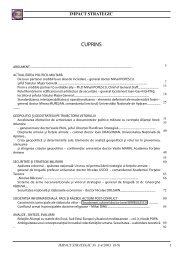
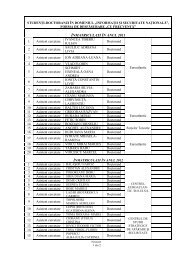
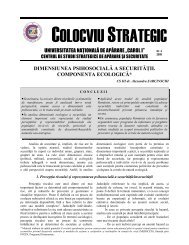
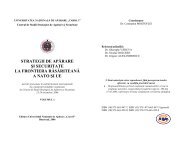
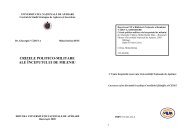


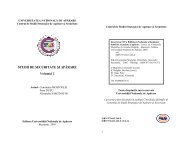
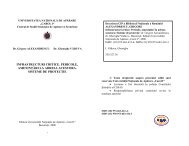
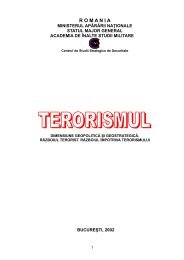
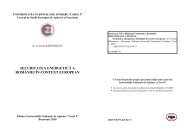
![„CAROL Nr 4 [29]/2008](https://img.yumpu.com/53801719/1/184x260/carol-nr-4-29-2008.jpg?quality=85)
